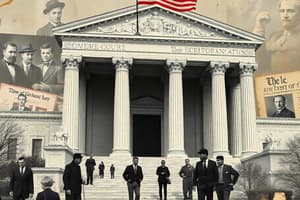Podcast
Questions and Answers
What was the ruling in Tape v. Hurley?
What was the ruling in Tape v. Hurley?
- Implemented racial restrictions on immigration
- Denied Chinese students admission
- Allowed segregation of Chinese students
- Ordered the city to admit Chinese students to public schools (correct)
What did United States v. Wong Kim Ark determine regarding citizenship?
What did United States v. Wong Kim Ark determine regarding citizenship?
The Court ruled that the Fourteenth Amendment awarded citizenship to children of Chinese immigrants born on American soil.
Fong Yue Ting allowed the federal government to expel Chinese aliens with due process of law.
Fong Yue Ting allowed the federal government to expel Chinese aliens with due process of law.
False (B)
What was the outcome of United States v. E.C. Knight Co.?
What was the outcome of United States v. E.C. Knight Co.?
What state law was voided in Lochner v. New York?
What state law was voided in Lochner v. New York?
Flashcards are hidden until you start studying
Study Notes
Tape v. Hurley
- In 1885, the California Supreme Court mandated that Chinese students be admitted to public schools.
- The state legislature reacted by enacting a law that allowed for segregated education.
- Joseph and Mary Tape, immigrants from China, protested against this legalized inequality.
United States v. Wong Kim Ark
- The 1898 ruling confirmed that the Fourteenth Amendment grants citizenship to U.S.-born children of Chinese immigrants.
- Justices upheld Congress's authority to impose racial restrictions on immigration despite the citizenship ruling.
Fong Yue Ting
- In 1893, the Court allowed the federal government to expel Chinese aliens without due process.
- The case was cited in 1904 when the Court upheld legislation that prohibited anarchists from entering the U.S.
United States v. E.C. Knight Co.
- The 1895 decision stated that the Sherman Antitrust Act could not be applied to dismantle a sugar refining monopoly.
- The ruling clarified that Congress has the power to regulate commerce, but not manufacturing.
Lochner v. New York
- In 1905, the Supreme Court invalidated a state law that limited bakers' working hours to ten per day or sixty per week.
- The decision emphasized a fundamental right to contract and limited government intervention in the economy.
Studying That Suits You
Use AI to generate personalized quizzes and flashcards to suit your learning preferences.




